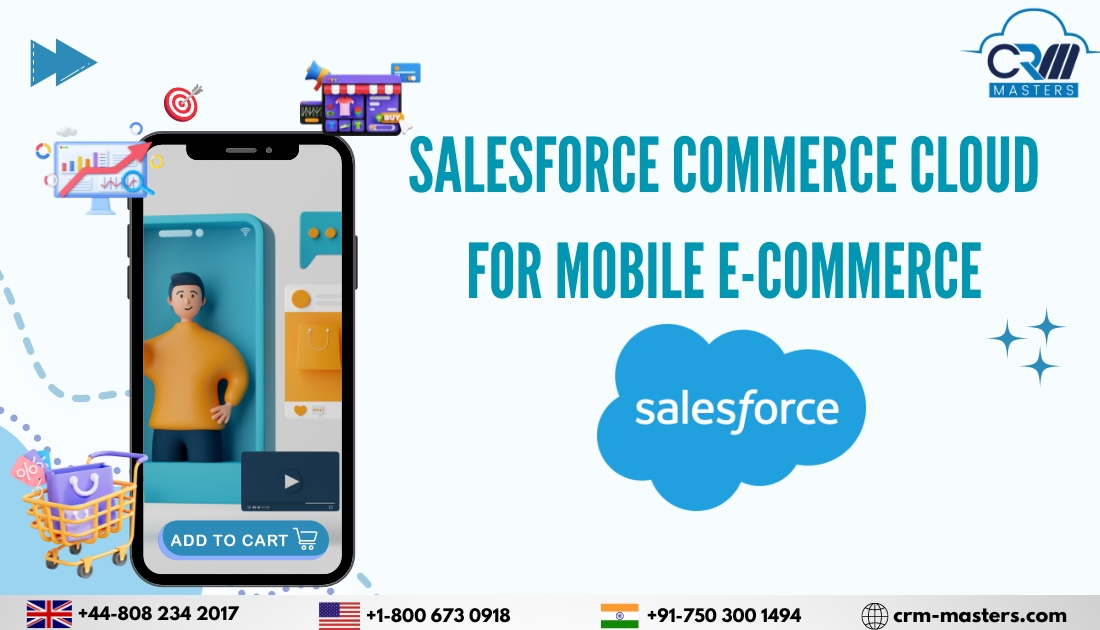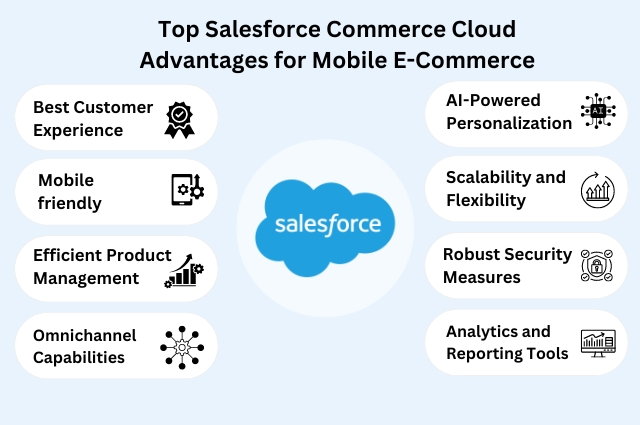
Benefits of Salesforce Commerce Cloud for Mobile E-Commerce
Staying ahead of the curve is important for businesses seeking growing success. With the rapid growth in mobile users, mobile e-commerce has become a pivotal channel for retailers to engage with customers. In this digital era, where convenience and seamless experiences are paramount, Salesforce Commerce Cloud emerges as a game-changer for mobile e-commerce.
This blog will guide you through the benefits of Salesforce Commerce Cloud, driving innovation and efficiency for businesses venturing into mobile e-commerce.
What Does Salesforce Commerce Cloud Do?
Salesforce Commerce Cloud is a cloud-based e-commerce platform designed to future-proof businesses. It enables the creation of captivating and intelligent shopping experiences for customers on diverse channels such as the web, social media, stores, and mobile platforms.
This platform offers a robust suite of ready-to-use functionalities, allowing businesses to seamlessly connect with existing and potential customers at every sales funnel stage. Salesforce Commerce Cloud provides exceptional customer service and support across various channels and platforms.
Moreover, it empowers businesses to harness omnichannel insights, effortlessly delivering and analyzing engagement behavior across all channels.
Top Salesforce Commerce Cloud Advantages for Mobile E-Commerce

1) Seamless Customer Experience:
One of the primary advantages of Salesforce Commerce Cloud for mobile e-commerce is its ability to deliver a seamless and personalized customer experience. The platform integrates with customer data, allowing businesses to create customized experiences based on user behavior, preferences, and purchase history for customer satisfaction.
2) Mobile-Optimized Design:
Responsive and optimized design is important, and Salesforce Commerce Cloud offers a mobile-responsive design that ensures flawless functions across various devices and screen sizes. This helps capture the attention of on-the-go consumers, providing them with a user-friendly interface.
3) Efficient Product Management:
Managing an extensive product catalog can be difficult for e-commerce businesses. Salesforce Commerce Cloud streamlines product management through a centralized system, making it easier for businesses to update product information and manage inventory. This efficiency is especially crucial for mobile e-commerce, where users expect real-time information and quick product access.
4) Omnichannel Capabilities:
Salesforce Commerce Cloud offers omnichannel capabilities that enable a seamless shopping experience across various touchpoints like mobile, desktop, social media, or in-store, the platform ensures consistency in product information, pricing, and promotions. This approach is important in creating a good brand experience and maximizing customer engagement.
5) AI-Powered Personalization:
AI is harnessed within Salesforce Commerce Cloud to deliver advanced personalization features. The platform analyzes customer behavior, predicts preferences, and recommends relevant products through AI algorithms, enhancing the overall shopping experience. Personalized recommendations drive sales and create a more immersive and enjoyable user shopping journey.
6) Scalability and Flexibility:
Commerce Cloud is designed to scale effortlessly as businesses grow. It helps accommodate the increasing demands of a growing customer base and expanding product catalogs. This scalability ensures businesses can adapt to changing market dynamics and seize new opportunities without compromising performance or user experience.
7) Robust Security Measures:
E-commerce businesses deal with sensitive customer information and financial transactions, so keeping the data secure is a top priority. Salesforce Commerce Cloud prioritizes security with powerful measures to protect against data breaches and cyber threats.
8) Analytics and Reporting Tools:
Informed decision-making is key to e-commerce success, and Salesforce Commerce Cloud provides analytics and reporting tools to empower businesses. From tracking customer behavior to analyzing sales trends, these tools offer valuable insights that can be leveraged to optimize marketing strategies, improve product offerings, and enhance overall business performance.
Also Read: Important Features and Benefits of Salesforce For the E-Commerce Industry
Features of Salesforce CRM for e-commerce businesses
Salesforce CRM offers rich features, making it an ideal choice for e-commerce businesses looking to streamline operations, enhance customer relationships, and drive growth.
Here are some key features of Salesforce CRM specifically beneficial for e-commerce:
1) 360-Degree Customer View:
Salesforce CRM provides a unified view of customer data, including purchase history, preferences, and interactions. This comprehensive customer profile allows businesses to understand their customers better and personalize interactions.
2) Sales Cloud Integration:
Integration with Sales Cloud enables seamless leads, opportunities, and sales process management. E-commerce businesses can efficiently track and manage sales activities, ensuring a smooth transition from lead generation to conversion.
3) Marketing Automation:
Salesforce CRM includes powerful marketing automation tools that enable businesses to create targeted and personalized marketing campaigns. E-commerce businesses can leverage these tools to engage customers, drive sales, and analyze campaign effectiveness.
4) Customer Service and Support:
The Service Cloud component of Salesforce CRM provides tools for managing customer service and support. E-commerce businesses can streamline customer inquiries, manage cases, and provide timely support through various channels, enhancing the overall customer experience.
5) E-Commerce Analytics:
Salesforce CRM offers advanced analytics capabilities that help e-commerce businesses gain insights into customer behavior, sales trends, and product performance. Businesses can make data-driven decisions to optimize their strategies and improve overall performance.
6) Mobile Accessibility:
Salesforce CRM is designed with mobile accessibility, allowing users to access critical customer information, monitor sales activities, and respond to customer inquiries. This mobile flexibility is crucial for e-commerce professionals needing real-time data access.
7) Lead and Pipeline Management:
E-commerce businesses can efficiently manage leads and opportunities through Salesforce CRM. The platform provides a systematic approach to lead tracking, nurturing, and converting opportunities into sales, ensuring a well-organized sales pipeline.
8) Inventory and Order Management:
Integration with inventory and order management systems enables e-commerce businesses to track product availability, manage stock levels, and streamline order fulfillment processes. This real-time visibility ensures efficient operations and minimizes stockouts.
9) Integration with E-Commerce Platforms:
Salesforce CRM can seamlessly integrate with popular e-commerce platforms, creating a unified ecosystem. This integration allows for synchronizing customer data, order information, and other crucial details between the CRM and the e-commerce platform.
10) Workflow Automation:
E-commerce businesses can automate repetitive tasks and processes using Salesforce CRM’s workflow automation features. This includes order processing, customer communications, and other routine activities, saving time and reducing manual effort.
11) Multi-Channel Engagement:
E-commerce businesses can engage with customers across multiple channels, including email, social media, and online chat, using Salesforce CRM. This multi-channel approach helps businesses stay connected with customers through their preferred communication channels.
12) AI-Powered Insights:
Integrating artificial intelligence (AI) features in Salesforce CRM provides predictive analytics and insights. E-commerce businesses can leverage AI to forecast trends, identify opportunities, and make informed decisions to stay ahead in a competitive market.
13) Security and Compliance:
Salesforce CRM prioritizes the security of customer data, implementing robust security measures and compliance standards. This ensures that sensitive information is protected, instilling customer trust and meeting regulatory requirements.
14) Customization and Scalability:
With extensive customization options, E-commerce businesses can tailor Salesforce CRM to their specific needs. Additionally, the platform is scalable, accommodating the growing needs of businesses as they expand and evolve.
Conclusion
Salesforce Commerce Cloud for mobile e-commerce positioning as a powerhouse for businesses seeking to thrive in the digital marketplace. the platform addresses the diverse needs of modern e-commerce.
CRM Masters as a Salesforce Consulting Partner helps businesses embrace Salesforce Commerce Cloud as a strategic move and a commitment to innovation, efficiency, and sustainable business growth.
Contact us if you want your e-commerce business to thrive in this competitive market.












